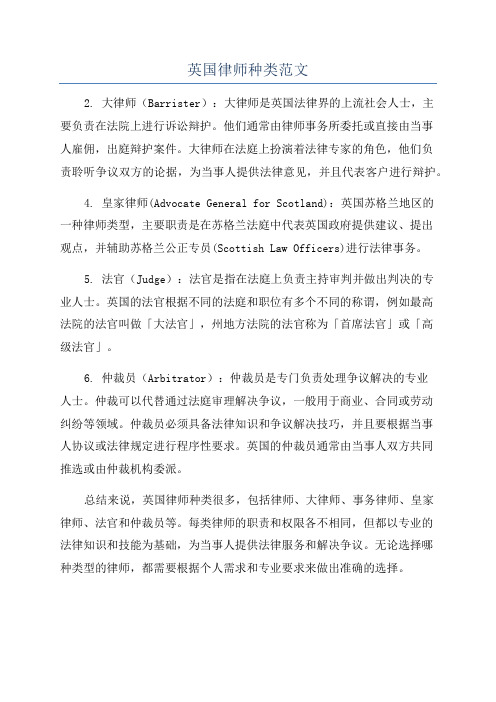法律英语漫谈(续二十八):律师在法庭上应该怎样称呼法官
律师如何称谓法官、书记员、当事人...

律师如何称谓法官、书记员、当事⼈...律师如何称谓法官、书记员、当事⼈...【导读】:⼈与⼈相处,需要彼此尊重,因为每个⼈都介意⾃⼰的存在,如何合适地称谓对⽅确实是⼀门学问。
不妥当的称谓从⼀开始就让对⽅对你产⽣反感,为进⼀步的交流与沟通预设⼀道障碍,⽐⽅说,你在街头问路,看到⼀名⽼者,穿着⼀般,也许他就是⼀名⼤学教授,你称呼他为师傅,显然不合适。
有的⼈不怎么⽼,你称呼他⽼先⽣,他⼼⾥也会不快,因为⼈都想年轻。
相反,⼀句合适的称谓,⽴即拉近了彼此的距离,我有⼀朋友,他每次在街上向⽼太太问路,都称对⽅为⼤姐,⽼太太⼀听,⼼⾥顿时⼀乐,⼀般都会很开⼼,并且很耐⼼地给他指路。
他⽤这种叫法屡试不爽。
本⼈年轻时,在江苏淮阴上班,有⼀天中午,我在办公室看书,突然⾛进⼀名⼥孩,向我问路,她开⼝⼀句“哥哥啊”,我听了⼼头⼀热,我没有妹妹,有⼈叫我哥哥,便很乐意向她解释如何到⽬的地。
旧友重逢,道⼀声兄弟,顿时⼀股暖流袭上⼼头。
以上事例简单说明了称谓在⼈际交往当中的重要性,作为律师,从事的是与⼈打资产的职业,在称谓问题上更应该引起重视。
曾经听到⼀名律师打电话给法院的书记员,称某书记员,该律师打完电话后,我问她,你怎么能这样叫书记员呢?该律师反问:“难道我还应该叫她法官不成?”。
事实上,在这种场合下,就应该称书记员为法官,因为在中国的法院,新进⼈员⼀般都是从书记员做起,过不了多少时⽇,书记员就成了法官,你叫她书记员,她能⾼兴吗?即使对有些专职书记员,律师在打电话时称其为法官,书记员⼀般也不会反感。
还有的律师,对庭长担任主审法官的,也称其为法官,这种叫法固然没错,但对某些看重权位的⼈,你叫他法官,他⼼⾥肯定不爽,你叫他庭长,他不⽤太开⼼,但肯定不会反感。
本段讲的是对待法院⼯作⼈员的称谓,下⾯讲⼀讲对待当事⼈的称谓。
知道对⽅的职务的,称其在单位的职务,⼀般都是合适的,但如果对⽅是副职,⼀定要将副字去掉。
没有职务的,男性称其为先⽣,⼥性称为⼥⼠,未婚的称为⼩姐,但⼀定要在⼩姐前加上对上的姓⽒,否则,给对⽅的感觉就不⽤我说了。
当庭如何用英语称“法官”?

法院开庭时,诉讼有关⼈员须称呼法官时,⼀般不称“张法官”、“李法官”⽽以称“审判长”为常(包括独任制法庭)。
不料有⼀次笔者所在的⼀所法律⾼等学校学⽣举⾏模拟法庭即“moot court”,⽽且要⽤英语进⾏。
应邀前去旁听,但见有⼀位英语⽔平并不低的是、学⽣在庭上称法官为“Judge”。
可惜,虽然⼀般场合称法官为 “Judge”者很普遍,但开庭时却称“Your Honor”:
“You admit having broken to the dress shop four times?” asked the judge.
“Yes,” answered the suspect.
“And what did you steal?”
“A dress, Your Honor,” replied the suspect.
—Reader's Digest, March 1996, p. 61
由此,回想到80年代初,在⼀个美国律师的汉语、中国法学习班有⼏位学会汉语的青年美国律师⽤汉语向中国同⾏演⽰其moot court的情景,其中最妙的是,他们把“Your Honor”是译成“⽼爷” 的——这⼤概是清末民处(北洋政府时期?)的法庭汉语(forensic Chinese)吧。
美国法官英文开场白

美国法官英文开场白原告、被告、律师、法官英文怎么翻译,在美国的叫法1、原告:抄accuser,plaintiff,complainant,laimant,prosecutor,在美国一般叫做prosecutor2、被告:defendant,defendant,indictee,respondent,the accused,在美国一般叫做defendant和the accused3、律师:attorney,barrister,counsellor,gownsman,lawyer,在美国一般叫做attorney和counsellor4、法官:judge,deemster,gownsman,judge,judiciary,justicer,law-officer,在美国一般叫做judge扩展资料美国诉讼程序:1、民事诉讼程序采用辩论制,独任审理;部分诉讼,特别是侵权诉讼等由陪审团裁断,法官判决。
2、刑事诉讼程序的特点是:联邦和若干州保留大陪审团审查重罪起诉的制度;非法取得的证据不得采zhidao纳;广泛使用审判前的“答辩交易”,辩护时,民事案件中的原告、被告律师,刑事案件中的公诉人和被告律师相互对抗争辩,法官不主动调查,仅起“消极仲裁人”的作用。
美国法官开庭和休庭都说些什么(要英文的)这个话不一定必须要由法官说,也可以由其助理说出来,并且联邦和州的法官说的有些不同,以联邦地区法院为例吧。
“The United States District Court for*(地区)is now in session.The Honorable(法官名),District Judge,persiding.All persons having business before this Coure,draw near,and you shall be heard.God save the United States and this Honorable Court.Court is in session.”上面是开庭时说的,至于休庭,没有什么特别的东西,通常是:The court is in recess.有没有人能简单介绍一下美国的法官制度啊(要英文版的)An administrative law judge(ALJ)in the United States is an official who presides at an administrative trial-type hearing to resolve a dispute between a government agency and someone affected by a decision of that agency.The ALJ is the initial trier of fact and decision maker.ALJ's can administer oaths,take testimony,rule on questions of evidence,and make factual and legal determinations.[1]The proceeding involved with the ALJ may be similar to a summary judgment.Procedure for reviewing an ALJ's decision varies depending upon the agency.Agencies generally have an internal appellate body,with some agencies having a Cabinet secretary deciding the final internal appeals.Moreover,after the internal agency appeals have been exhausted,a party may have the right to file an appeal in the courts.Relevant statutes usually require a party to exhaust all administrative appeals before they are allowed to sue an agency in court.Federal ALJ's are appointed under the Administrative Procedure Act(APA).Their appointments are non-political and based on scores achieved in a comprehensive testing procedure.Federal ALJs are the only merit-based judicial corps in the United States.The APA is designed to guarantee the independence of ALJs.They have absolute immunity from liability for their judicial acts and are triers of fact\"insulated from political influence.\"Federal administrative law judges are not responsible to,or subject to the supervision or direction of employees or agents of the federal agency engaged in the performance of investigative or prosecution functions for the agency.Agency officials may not interfere with their decision making andadministrative law judges may be discharged only for good cause established and determined after a hearing on the record.[2] Only,ALJ's receive these protections.Some agencies conduct hearings before individuals referred to as\"hearing officers\"or\"trial examiners.\"These individuals may perform functions similar to those of ALJ's,but they are not protected by the APA.In American administrative law,ALJs are Article I judges,and are not Article III judges under the U.S.Constitution.Unlike Article III judges,Article I judges are not confirmed by the Senate.However,the United States Supreme Court has recognized that the role of a federal administrative law judge is\"functionally comparable\"to that of an Article III judge.An ALJs powers are often,if not generally,comparable to those of a trial judge:He may issue subpoenas,rule on proffers of evidence,regulate the course of the hearing,and make or recommend decisions.The process of agency adjudication is currently structured so as to assure that the hearing examiner exercises his independent judgment on the evidence before him,free from pressures by the parties or other officials within the agency.\"[3]Most U.S.states have a statute modeled after the APA or somewhat similar to it.In some states,like New Jersey,the state law is also known as the Administrative Procedure Act.Unlike Federal ALJs,whose powers are guaranteed by the APA federal statute,state ALJs have widely varying power and prestige.In some state law contexts,ALJs have almost no power;their decisions are accorded practically no deference and become,in effect,recommendations.In some agencies,ALJs dress like lawyers in business suits,share offices,and hold hearings in ordinary conference rooms.In other agencies(particularly theDivision of Workers' Compensation of the California Department of Industrial Relations),ALJs wear robes like Article III judges,insist on being called\"Honorable\"and\"Your Honor,\"work in private chambers,hold hearings in special\"hearing rooms\"that look like little courtrooms,and have court clerks who swear in witnesses.There are three nationwide professional organizations for ALJs:the National Association of Administrative Law Judiciary(note that there is no\"the\"in the NAALJ's name),the Federal Administrative Law Judges Conference,and the Association of Administrative Law Judges.美国首席大法官终身制的英文怎么说如题美国首席大法官终身制The chief justice of the United States英[ˈdʒʌstis]美[ˈdʒʌstɪs]n.正义;公正;法律制裁;审判员,法官;美国法庭开庭法官及证人的宣誓词美国小学生每天上午都要宣读的效忠誓词:我向美利坚合众国国旗及其所代表的共和国宣誓效忠,这一上帝庇护下的国度不可分割,民众享有自由和公正。
英国律师种类范文

英国律师种类范文
2. 大律师(Barrister):大律师是英国法律界的上流社会人士,主
要负责在法院上进行诉讼辩护。
他们通常由律师事务所委托或直接由当事
人雇佣,出庭辩护案件。
大律师在法庭上扮演着法律专家的角色,他们负
责聆听争议双方的论据,为当事人提供法律意见,并且代表客户进行辩护。
4. 皇家律师(Advocate General for Scotland):英国苏格兰地区的
一种律师类型,主要职责是在苏格兰法庭中代表英国政府提供建议、提出
观点,并辅助苏格兰公正专员(Scottish Law Officers)进行法律事务。
5. 法官(Judge):法官是指在法庭上负责主持审判并做出判决的专
业人士。
英国的法官根据不同的法庭和职位有多个不同的称谓,例如最高
法院的法官叫做「大法官」,州地方法院的法官称为「首席法官」或「高
级法官」。
6. 仲裁员(Arbitrator):仲裁员是专门负责处理争议解决的专业
人士。
仲裁可以代替通过法庭审理解决争议,一般用于商业、合同或劳动
纠纷等领域。
仲裁员必须具备法律知识和争议解决技巧,并且要根据当事
人协议或法律规定进行程序性要求。
英国的仲裁员通常由当事人双方共同
推选或由仲裁机构委派。
总结来说,英国律师种类很多,包括律师、大律师、事务律师、皇家
律师、法官和仲裁员等。
每类律师的职责和权限各不相同,但都以专业的
法律知识和技能为基础,为当事人提供法律服务和解决争议。
无论选择哪
种类型的律师,都需要根据个人需求和专业要求来做出准确的选择。
法律英语课件第二课

法律英语
1
ቤተ መጻሕፍቲ ባይዱackground
律师 法官 检查官 法学教师
法律职业
法律英语
2
Part 1 The Bar
Bar——法庭中将公众与法官、律师
及其他诉讼参与人分隔开的隔板。 后来用于通指法律职业或律师职业。
美国律师协会
法律英语 3
lawyer to serve on boards of directors of corporate clients, to engage in business, and to participate actively in public affairs.
在公司的董事会任职
从事商业活动
积极参与公共事务
• The Multistate Bar Examination (MBE) is a six-hour, twohundred question multiplechoice examination covering contracts, torts, constitutional law, criminal law, evidence, and real property.
of the Multistate Bar Exam, a daylong multi-choice test, to which the states adds a day-long essay examination emphasizing its own law.
各州律师联考 州综合问答题
法律英语 8
法律英语 22
In the field of advocacy, the rules are
高二英语法律用语单选题40题

高二英语法律用语单选题40题1. In a court case, the _____ is the person who brings a lawsuit against another.A. PlaintiffB. DefendantC. JudgeD. Jury答案:A。
解析:Plaintiff是原告的意思,在法庭案件中,是提起诉讼控告他人的一方。
Defendant是被告,是被起诉的一方。
Judge是法官,负责审判案件。
Jury是陪审团,负责对案件事实作出判断,所以这里应选A。
2. The _____ has to defend himself or herself in the court.A. PlaintiffB. DefendantC. WitnessD. Lawyer答案:B。
解析:Defendant是被告,被告需要在法庭上为自己辩护。
Plaintiff是原告。
Witness是证人,是提供证据的人。
Lawyer是律师,可代理原告或被告,这里说要自我辩护的是被告,所以选B。
3. After hearing all the evidence, the jury will give their _____.A. SentenceB. VerdictC. ChargeD. Fine答案:B。
解析:Verdict意为裁决,陪审团在听取所有证据后给出裁决。
Sentence通常指法官宣判的刑罚。
Charge可表示指控或罪名。
Fine是罚款,所以这里应选B。
4. A _____ is a person who saw or can give a first - hand account of an event in a court case.A. LawyerB. JudgeC. WitnessD. Defendant答案:C。
解析:Witness是证人,是在法庭案件中目睹事件或能提供第一手描述的人。
法庭上怎么称呼法官

法庭上怎么称呼法官
一般情况下,法官的称呼是审判长、审判员。
知道领导的职位,庭长、院长、法官,加上姓即可,如某院长。
不知道职位,一律称呼某法官最好。
在中国,《中华人民共和国法官法》第二条明文规定“法官是依法行使国家审判权的审判人员,包括最高人民法院、地方各级人民法院和军事法院等专门人民法院的院长、副院长、审判委员会委员、庭长、副庭长、审判员和助理审判员。
”
在民事诉讼审判中法官应当是依照法律规定的程序产生的,依法行使国家民事诉讼审判权的审判人员,而且法官在审判过程中不应受任何行政机关、社会团体、企事业单位及个人的干扰。
法官应当是独立的、中立的享有法定的裁判权,具有当然的裁判权威的第三方。
法官应当依法享有的权利:
(一)履行法官职责应当具有的职权和工作条件;
(二)依法审判案件不受行政机关、社会团体和个人的干涉;
(三)非因法定事由、非经法定程序,不被免职、降职、辞退或者处分;(四)获得劳动报酬,享受保险、福利待遇;
(五)人身、财产和住所安全受法律保护;
(六)参加培训;
(七)提出申诉或者控告;
(八)辞职。
律师与法官的对话

某日开庭后,法官与律师惺惺相惜,于是有了下面一番对话:●法官:律师先生,你潇洒也。
收了当事人的钱,在庭上言语一通,拔脚便走,留下一大堆活,由我来负责。
真有点不公平。
○律师:法官阁下,非也。
我自己给自己发工资,收点钱也不容易,还要受当事人指使。
不如你,尊严又体面,有权又衣食无忧。
●法官:权是有点,但只是在庭上,开完庭,权就没了。
我上面庭长、院长等领导无数,他们管着呢。
工作固然体面,但发展空间有限,一辈子在各个庭轮岗。
○律师:你独立审判,可以不听人管,领导不熟悉案情,也难以管啊?●法官:领导管不住具体案件,但管得住人。
若我不考虑领导意见,在这个案件上独立了,但在下次晋升或者调动上,也就难了。
至于这点工资,也只能养家糊口,与你律师比,又算得了什么?。
○律师:听着律师钱多,其实律师的钱还要分给别人的,比如上交所里、上缴税金,给案件介绍人报酬。
钱,不纯也。
现在的律师,都是两条腿走路,一是关系,二是法律,关系在先,法律在后。
钱,要拿去铺关系啊●法官:哎,我还再想你刚才在庭上说的话有没有道理呢?○律师:我的话里面,有些是说给我的当事人听的,即使当事人没有道理,但为满足他的感情,我还得说;有些是说给对方当事人听的,让他觉得,我作为律师只想和平解决问题,而不是来得罪人的;有些话,才是说给你听的呢。
●法官:这个我当然能明辨,判断力可是法官的第一要素。
所以,我在庭上要控制你的发言,只让你讲该讲的。
至于你的狡辩,可是职业表演,我是不会理睬的,不过,我也还是要找个理由来驳掉它。
○律师:你慢慢驳,可以在判决书上告诉我。
问题是,法官在判决书中老是回避分析过程,而只是告诉一个结果,理由还得律师去猜,我又不是你,又如何想得出。
●法官:我只告诉我想告诉的,还有的是无法告诉的,比如我认为哪个当事人诚实,那是庭审的直觉,直觉是无法以语言来表达的。
其实,判决书好不好,与你律师是大有关系的。
○律师:判决书是你写的,是你文采、法律知识、经验、逻辑等的综合,与律师关系不大吧。
